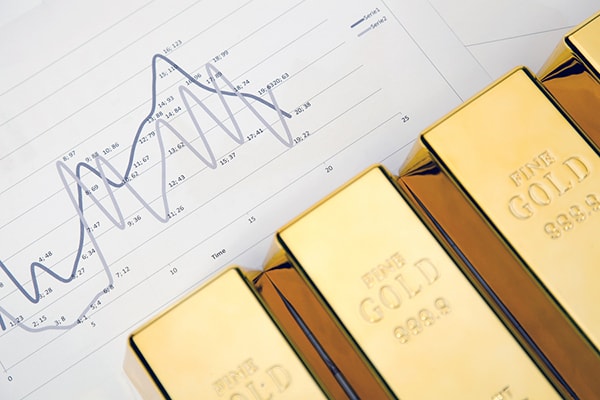
Gold investors saw a big jump in gold prices on Tuesday, as futures were up 1.6% to $1,201.90 an ounce. The increase happened after Japan announced some negative economic news which led to a decrease in the U.S. dollar.
The yellow metal began moving up today after Japanese Prime Minister Shinzo Abe said the government will delay a planned increase in sales tax for at least 18 months. He also announced that he will dissolve the lower house of parliament on November 21st and he called for emergency elections to be held in December.
According to CNBC, the Prime Minister is reacting to recent data showing the “world’s third-biggest economy unexpectedly shrank for a second-consecutive quarter in July-September, after the initial sales tax hike clobbered consumer spending.” Abe announced the early elections with the hope that the newly elected members of parliament will back his latest economic revival plan, which is being called “Abenomics.” The plan includes “massive government spending, an easy money credit policy, and a package of reforms designed to spur growth.”
The problem is that most experts feel this plan will not work and this has led to declines in the dollar and other major markets. All of this is positive news for gold investors.
However, Edward Meir of INTL FCStone told MarketWatch that he feels investors should “not get too upbeat about gold’s prospects despite the metal’s recent signs of life. The dollar and U.S. equity rallies still have more room to run and…gold will therefore find it increasingly difficult to withstand these headwinds going forward,” Meir sad.
Meir may be taking the glass is half full view of the equity markets, but a legend in the investment banking world, John Ing, CEO of Maison Placements Canada and who has been in the business for 43 years, is predicting a much bleaker future. Yesterday, Ing told King World News 1 that he thinks the gold market is going to see a massive surge above $2,000 an ounce.
“The sentiment in the mining shares is extremely negative, and the long-term relative strength in this group is almost as zero. This is an incredibly rare set up,” Ing said. “In the midst of all this negative sentiment, China continues to buy gold. The Russians also continue to be big buyers of gold. The Russians are now the 5th largest holder of gold in the world, ahead of even China. So central banks are still buying gold and it’s just a matter of time before we get a substantial move higher in the price.”
No matter who you believe, the fact is that major governments are buying gold while other governments are desperately trying to put together economic recovery plans to pull their nations out of recession. All of this seems to be a good sign for the future of gold prices, but volatility in all areas of the market is not going away either.
Additional Sources


